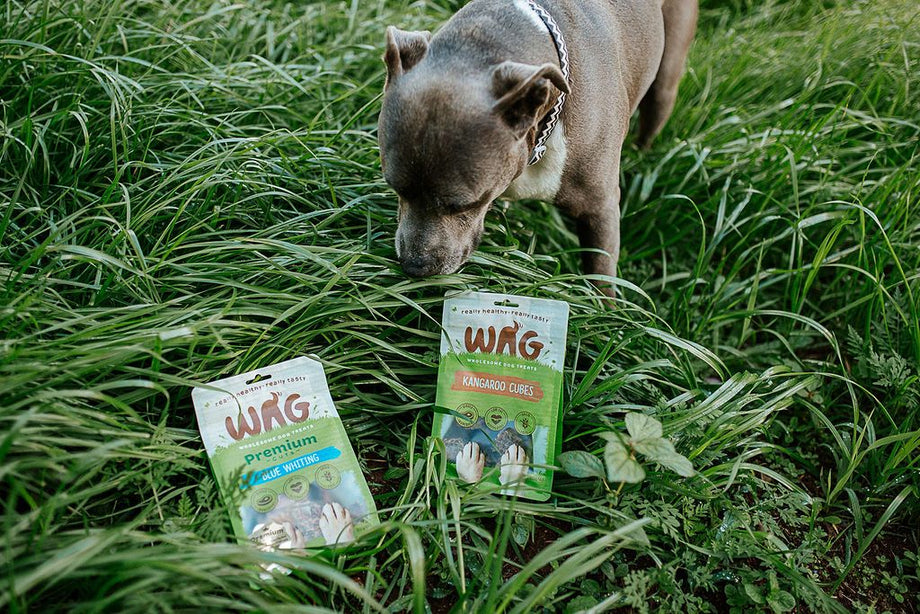Is feeding your dog a ‘plant-based’ or vegan diet a bad idea?

It’s no secret that at WAG we wholeheartedly support a future that’s eco-friendly, sustainable and holistic. We keep a close eye on our ecological foot-print and ensure that our processes are innovative and as harmless as possible to the greater ecology and global environment. We understand that the production and consumption of animal products can present a burden to the ecosystem and do our utmost to include advanced sustainable practices.
But it’s not just us taking steps towards a better, brighter, greener future – the world at large is taking great leaps towards more ethical processing. More and more, voices are growing louder about protecting and defending our planet from the ruinous effects of climate change, mass production and consumption of vital resources. These voices have been hugely influential, affecting how large-scale companies procure and package their products, trickling all the way down to how individuals and families manage their household waste.
If you’ve suddenly noticed an enormous rise in the vegan, vegetarian and plant-based population then you’re not the only one. It’s been estimated that over the last decade, veganism has increased globally by 600% – and that number continues to grow annually. With so much attention directed towards diets and lifestyles devoid of animal products, it’s no surprise that some pet owners are following suit with their furry family – a phenomenon that has attracted grand scale controversy and heated discussion.
Have you ever wondered to yourself if feeding a plant-based, vegan or vegetarian diet to your dog is a good idea? Stick around to see how understanding the scientific power of nutrition can inform the next diet change you make for your doggo.
Do dogs really need meat?
Dogs belong in the Carnivora family, meaning a group of animals whose members consume meat and animal products. They feature a unique arrangement of teeth and a distinctive skull shape that is designed to tear and shear meat and bones. Their digestive system is especially efficient at processing vitamins, nutrients and minerals from animal products, and not so efficient at digesting plant and vegetable matter.
Here’s where it gets complicated. Dogs share the Carnivora title with mammals like bears, racoons, and pandas – highly omnivorous animals who’s diet changes depending on the season, current habitat, and availability of resources. Like dogs, these animals might not digest plant matter and starches as well as other species, but they are certainly capable of putting them to use.
Undoubtably meat provides a variety of essential proteins for dogs, some of which (like collagen and keratin) are exceptionally challenging and in some cases impossible to derive from a vegan diet. Meat and animal products are highly bioavailable to dogs, meaning they contain a large number of nutrients that can be absorbed and put to use by the body. Beyond that, meat is exceptionally palatable: when presented with a bowl of juicy, flavourful meat or a fresh veggie treat, very few dogs would choose the latter.
Do dogs need vegetables?

The bioavailability of fruits and vegetables are reduced in comparison to animal meat, bones and organ. Whilst your dog might enjoy snacking on a fresh vegetable every once and a while, they probably won’t be doing a whole lot of good – and you might even occasionally notice some of it come out the other end completely unprocessed.
But even for dogs, fruit and vegetables can provide beneficial vitamins and nutrients. Whilst they are enormously lacking in essential fats and proteins, they can help foster a healthy gut and digestive prebiotics, probiotics and antioxidants. Despite what you might have heard, the canine digestive system is quite capable of digesting and utilising nutrients from fruits and vegetables – with a catch.
But that doesn’t mean that plant matter can’t still be beneficial. Whilst the bioavailability will still be reduced in comparison to meat, heating and pureeing plant matter will take some of the strain off the canine digestive system – meaning they can put less energy into ingestion and more into utilising the beneficial vitamins.
What about starches?
In case you needed the recap: a starch is a form of carbohydrates. Foods traditionally high in starches include potatoes, beans, lentils and grains. Some fruits and vegetables contain starch, including peas, corn and bananas.
Whilst their wild wolf counterparts aren’t quite so lucky, modern day dogs are particularly adept at digesting starch. Research has indicated that, due in large part to the canine-human relationship and evolution, dogs have an increased amount of the enzyme amylase. This enzyme allows for efficient digestions of starch and has allowed dogs to digest starch a staggering five-times-better than wolves.
So, can my dog be a vegan or vegetarian?
The answer is: it’s complicated.

A meat-free diet that reaches all nutrient targets can be done and can even be useful when used for therapeutic reasons, particularly for dogs with conditions like protein allergies. But that doesn’t mean it’s easy.
It’s extraordinarily difficult to formulate a meat-free diet without causing deficiencies and should never be attempted unless under the guidance of a canine nutritionist. There are also numerous drawbacks: due to the lower bioavailability of vegetables, fruit and (to a lesser degree) starches, you will need to feed much more to reach nutrient targets than you would with a meat-inclusive diet. More food means more waste, so you’ll likely notice an increase in stool and a deterioration in quality.
Done correctly and under the supervision of a canine nutritionist, plant-based diets can be useful for dogs with specific health conditions and dietary needs. But making your dog vegan or vegetarian without the guidance of a professional can result in catastrophe: including illness, health complications and life-threatening malnutrition.
Up Next
The complete guide to transitioning your dog to natural food
